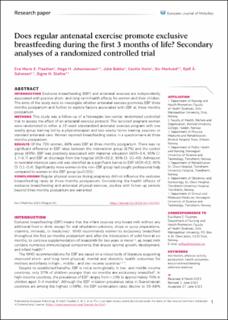| dc.contributor.author | Flaathen, Eva Marie E. | |
| dc.contributor.author | Johannessen, Hege Hølmo | |
| dc.contributor.author | Bakke, Julie | |
| dc.contributor.author | Holm, Cecilie | |
| dc.contributor.author | Mørkved, Siv | |
| dc.contributor.author | Salvesen, Kjell Å. | |
| dc.contributor.author | Stafne, Signe N. | |
| dc.date.accessioned | 2024-01-21T23:09:08Z | |
| dc.date.available | 2024-01-21T23:09:08Z | |
| dc.date.created | 2023-10-31T10:08:02Z | |
| dc.date.issued | 2023 | |
| dc.identifier.citation | European Journal of Midwifery. 2023, 7 (August), Artikkel 20. | en_US |
| dc.identifier.issn | 2585-2906 | |
| dc.identifier.uri | https://hdl.handle.net/11250/3112906 | |
| dc.description.abstract | INTRODUCTION Exclusive breastfeeding (EBF) and antenatal exercise are independently ssociated with positive short- and long-term health effects for women and their children. The aims of the study were to investigate whether antenatal exercise promotes EBF three months postpartum and further to explore factors associated with EBF at three months postpartum.
METHODS This study was a follow-up of a Norwegian two-center randomized controlled trial to assess the effect of an antenatal exercise protocol. The recruited pregnant women were randomized to either a 12-week standardized antenatal exercise program with one weekly group training led by a physiotherapist and two weekly home training sessions or standard antenatal care. Women reported breastfeeding status in a questionnaire at three months postpartum.
RESULTS Of the 726 women, 88% were EBF at three months postpartum. There was no significant difference in EBF rates between the intervention group (87%) and the control group (89%). EBF was positively associated with maternal education (AOR=3.4; 95% CI: 1.7–6.7) and EBF at discharge from the hospital (AOR=22.2; 95% CI: 10–49). Admission to neonatal intensive care unit was identified as a significant barrier to EBF (AOR=0.2; 95% CI: 0.1–0.4). Significantly more women in the non-EBF group had sought professional help compared to women in the EBF group (p≤0.001).
CONCLUSIONS Regular physical exercise during pregnancy did not influence the exclusive breastfeeding rates at three months postpartum. Considering the health effects of exclusive breastfeeding and antenatal physical exercise, studies with follow-up periods beyond three months postpartum are warranted. | en_US |
| dc.language.iso | eng | en_US |
| dc.publisher | European Publishing | en_US |
| dc.rights | Navngivelse 4.0 Internasjonal | * |
| dc.rights.uri | http://creativecommons.org/licenses/by/4.0/deed.no | * |
| dc.subject | risk factors | en_US |
| dc.subject | physical activity | en_US |
| dc.subject | postpartum | en_US |
| dc.subject | health outcomes | en_US |
| dc.subject | exclusive breastfeeding | en_US |
| dc.subject | antenatal exercise | en_US |
| dc.title | Does regular antenatal exercise promote exclusive breastfeeding during the first 3 months of life? Secondary analyses of a randomized controlled trial | en_US |
| dc.type | Peer reviewed | en_US |
| dc.type | Journal article | en_US |
| dc.description.version | publishedVersion | en_US |
| dc.rights.holder | © 2023 Flaathen E. M. E. et al. | en_US |
| dc.subject.nsi | VDP::Medisinske Fag: 700::Klinisk medisinske fag: 750::Pediatri: 760 | en_US |
| dc.source.volume | 7 | en_US |
| dc.source.journal | European Journal of Midwifery | en_US |
| dc.source.issue | August | en_US |
| dc.identifier.doi | 10.18332/EJM/167807 | |
| dc.identifier.cristin | 2190347 | |
| dc.source.articlenumber | 20 | en_US |
| cristin.ispublished | true | |
| cristin.fulltext | original | |
| cristin.qualitycode | 1 | |

